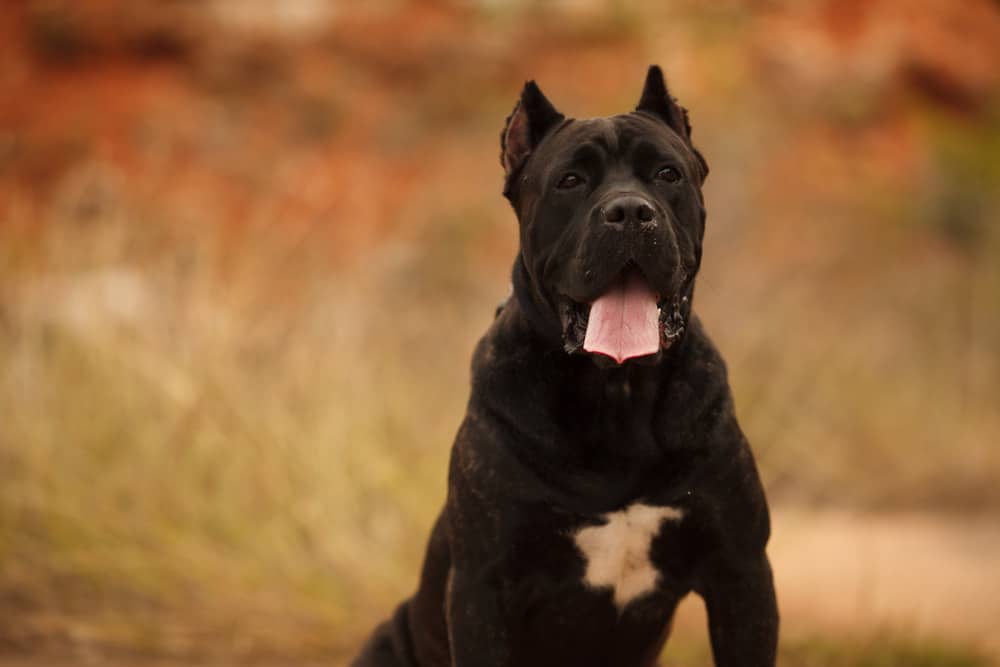Factors That Affects The Price Of Cane Corso in America:
Cane Corso is often found and is expensive. On the outskirts of the city and in sparsely populated regions you can buy a puppy cheaper. The better the health of the animal, the more expensive it is.
The presence of veterinary documents and pedigree increases the price of the puppy. If an animal has titled parents, it will be sold at a higher price. See below the factors that affect the price of Cane Corso in America.
Health:
To make sure they are generating healthy puppies, reputable breeders frequently test their dogs for a variety of health problems. The buyer is often responsible for covering the expense of these potentially costly health exams.
Demand:
In recent years, Cane Corsos have gained popularity, which has increased demand for them and raised their price.
Quality:
It takes more breeding and training to produce Cane Corsos that are bred for competition or show. These dogs’ show-quality qualities can make them more pricey.
Breeding Costs:
Cane Corsos can be challenging to breed, and respectable breeders will frequently spend a large sum of money, time, and effort on breeding and raising their offspring. The price of the puppies may go up as a result.
Breeder Standing:
Puppies from reputable breeders who are well-known for producing healthy and superior Cane Corsos may fetch a higher price.
Age:
In general, puppies cost more than adult dogs do.
Bloodline and Pedigree:
Impressive pedigrees and bloodlines can fetch greater prices for Cane Corsos.
Gender:
Price ranges for male and female Cane Corsos may differ.
Geographic Location:
The cost of Cane Corsos may also differ based on the area or nation in which you find yourself.
Price Of Cane Corso In Different States Of America
[table id=15 /]
Is The Cane Corso Popular In America:
Yes, the Cane Corso is one of the popular dog breeds in America. The Cane Corso has long served people: guarding property, protecting it, helping in the field, and hunting. This is a fairly large dog, with a menacing and impressive appearance.
In the 21st century, it has become a popular pet. This is explained by the unusual good nature and devotion of the representatives of the breed, as well as unpretentiousness and ease of care.
Such dogs have served man for a long time. In addition to participating in gladiatorial battles, they guarded houses, went hunting, and even took part in war.
They were highly valued and expensive. In the Middle Ages, these large Italian dogs were used to herd wild animals, herd livestock, and protect homes.
Cane Corso Availability In America:
Cane Corsos are widely available in America. Cane Corsos remained popular for many centuries, but their numbers declined greatly in the mid-20th century.
In a familiar and “non-working” environment, these dogs are not averse to frolicking carelessly: they love active games, run after the ball with pleasure, and play various sports.
Price Of A Cane Corso In America:
From $1,500 to $4,000 is how much a breeder will charge for a purebred Cane Corso. Prices for rarer coat colors may range from $2,000 to $5,000 or more.
The lifespan cost of a Cane Corso can vary greatly depending on various factors including as general lifestyle, grooming requirements, and health.
Monthly Maintenance Cost:
Food: $80–$100
These are large canines, with adult males and females weighing up to 100 pounds each.
These dogs require roughly five cups of premium, veterinarian-recommended kibble each day to maintain a healthy weight; the cost of this food will vary according to the breed of dog you have.
Together with fruits and vegetables, some pet parents also decide to include supplements in their pet’s diet.
Just a reminder that while these supplements might be highly nutrient-dense, they are not required and can raise the expense of feeding your cat.
Costs of Medical Care: $500–$700
It is advised that your Cane Corso visit the veterinarian three to four times in the first year.
In addition to other advised preventative care procedures, yearly wellness checkups and blood tests are frequently included in veterinarian expenses, which can range from $100 to $300.
An additional $300 to $400 may be needed for additional exams and tests.
Cane Corsos are susceptible to specific health issues throughout their lives, just like dogs of any breed. Owing to their high levels of activity, this breed frequently develops elbow and hip dysplasia.
They are also prone to bloating because of their huge, deep chest, which in severe circumstances can be fatal. Other general illnesses that should be routinely checked out include skin conditions and ear infections.
Grooming: $40–$50
The double-layered coat of Corso dogs sheds all year round. Frequent brushing can contribute to a hair-free, tidy home. A hairbrush might cost about $20 if you decide to groom your dog at home.
It is also strongly advised to bathe once a month, cut nails twice a month, and have your teeth and ears cleaned.
To further pamper your dog, consider investing in nail trimmers and dental cleaning equipment. These goods might cost between $20 and $30 total.
Why Get A Puppy From Cane Corso Breeders in America [Breeder Reputation]:
Cane Corso’s personalities are exact replicas of their breeders’ personalities. They know how to adjust to their master and have a deep love for him.
The dog will also be aggressive and imbalanced if he is.
The Cane Corso will not develop violent tendencies as it grows up if the owner is tranquil.
Genetics accounts for half of a dog’s personality, with the other half coming from socialization and human influence.
Why Choose Best For Pets To Purchase Cane Corso Puppies In America:
The Cane Corso is almost a direct descendant of those very ancient Roman gladiator dogs.
Molosser genetics have only been improved over the centuries, and as a result, modernity has received obedient, efficient, and intelligent dogs. There are several reasons to own a Cane Corso.
Benefits Of Purchasing A Cane Corso in America:
There are some benefits of purchasing a Cane Corso. These are…
Barks Very Little:
The Cane Corso is not a very barking dog, despite popular belief. Although they don’t always bark in their daily lives, they do not think twice to let their owners know when they see strangers.
The Cane Corso is a reasonably placid dog by temperament, provided they live in a stable, quiet environment and get frequent exercise.
Easy To Take Care:
One of the rare breeds that requires very little maintenance is the Cane Corso, despite their frightening build and big size. Its short coat sheds little to no hair and doesn’t get too dirty. One weekly brushing is more than sufficient.
Even if taking care of their coat is simple, it’s still necessary to periodically clean and monitor their eyes and ears.
The Cane Corso makes a Great Watchdog:
This breed is renowned for making excellent security dogs. Cane Corsos are not only devoted and faithful, but they will stop at nothing to keep people safe. The Cane Corso is the ideal dog if you want to feel safe and content.
They Belong to a Lovely Breed:
It could be their unique appearance that entices you to a dog. A beautiful dog with many amazing qualities, the Cane Corso has a robust physique and rough appearance.
This may be one of the most attractive pets you have ever owned if you have raised dogs your entire life and know how to care for the Cane Corso breed.
Just watch out that you never purchase a breed just because you enjoy its appearance!
Response Good In Training:
Compared to other mastiff breeds, the Cane Corso breed is known for its keen observation of its owner and its high level of training responsiveness.
The Cane Corso will listen to and appreciate a confident and steady owner despite their powerful and dominant stature and generally strong-willed attitude.
Here, it’s crucial to start training at a very young age and to be tough and consistent in your tactics. Puppies learn new behaviors quickly and effectively, and they stick with them.
The Cane Corso is an intelligent, laid-back, and eager-to-please breed when educated correctly.
They Make Great Companion:
They are known to go to great lengths to appease their owner’s family because they are an intensely devoted breed. Because of their innate protective nature, Cane Corsos also make excellent pets. They will protect your family and are regarded as the “guardian” dog.

Cane Corso Vaccination Cost In America
Here’s a breakdown of the typical costs associated with vaccinating a Cane Corso in America:
Core Vaccines (Essential)
- DHPP (Distemper, Hepatitis, Parainfluenza, Parvovirus):
- Puppies: Series of 3-4 shots, $20-$60 each
- Adults: Booster every 1-3 years
- Rabies:
- Puppies: One shot around 12-16 weeks, $20-$30
- Adults: Booster every 1-3 years (depending on state laws)
Optional Vaccines (Based on Lifestyle & Risk)
- Bordetella (Kennel Cough): $30-$50 (may be required for boarding or doggy daycare)
- Lyme Disease: $20 – $40 initially, then annually if recommended by your vet
- Leptospirosis: $20 – $30 initially, then annually if recommended
- Canine Influenza: $45 – $65 initially, then annually if recommended
Cost Factors:
- Location: Vet prices can differ across the US.
- Clinic: Costs vary between private clinics and low-cost vaccination clinics.
- Puppy Packages: Some clinics offer packages bundling initial puppy vaccinations at a slightly reduced cost.
Typical Cost Ranges
- First Year Vaccinations: Anticipate spending around $100 – $350 for a puppy’s first year, including both core and optional vaccines.
- Annual Booster Costs: After the first year, annual costs for core boosters range from approximately $80 – $250.
Saving on Vaccination Costs:
- Low-cost Vaccination Clinics: Check for options offered by shelters or humane societies in your area.
- Pet Insurance: Some pet insurance plans provide coverage for preventative care, which may include vaccinations.
- Wellness Plans: Veterinary clinics often offer wellness plans that allow you to spread out the cost of preventive care throughout the year.
Important Things to Note
- Vet Recommendations: Consult your veterinarian to create the best vaccination schedule for your Cane Corso based on their individual needs and your area’s disease risks.
- Health Considerations: As a large breed, Cane Corsos might be more sensitive to vaccination reactions. Discuss this with your vet.
Cane Corso Deworming Cost In America
Here’s a breakdown of the costs associated with deworming a Cane Corso in America:
Factors Affecting Cost:
- Type of Dewormer: Different deworming medications target specific worm types (roundworms, hookworms, tapeworms, etc.). Your veterinarian will recommend the best based on your dog’s needs.
- Dosage: Dewormer cost is often calculated by your dog’s weight, so a large breed like the Cane Corso might require slightly higher doses.
- Veterinary Clinic: Vet clinic fees can vary across the US.
- Puppy vs. Adult: Puppies usually require more frequent deworming.
Typical Cost Ranges
- Single Deworming Treatment: Expect to pay around $15 – $50 per treatment.
- Puppy Deworming Protocol: Puppies will need a series of deworming treatments over the first few months of life. The overall cost might be higher initially.
- Preventative Heartworm Medication: Many heartworm medications also contain deworming agents, providing convenient and cost-effective prevention. These generally range from $5 – $25 per month.
How Often Should You Deworm a Cane Corso?
Your veterinarian is the best source for determining the ideal deworming schedule for your Cane Corso. Here’s a general guideline:
- Puppies: Deworm every 2-3 weeks until 12 weeks of age, then monthly until 6 months old.
- Adult Dogs: At least twice a year. More frequent treatments may be needed based on risk factors and fecal exams.
Where to Get Deworming Medication:
- Vet prescription: The safest and most accurate way to ensure the correct medication and dosage is through your veterinarian.
- Over-the-counter options: Available at pet stores but might not be as effective or target the correct worm types. Consulting your vet first is best.
Important Considerations:
- Fecal Exams: Regular fecal exams help your vet determine if parasites are present and choose the most appropriate treatment.
- Prevention: Good hygiene practices (picking up feces, washing hands, etc.) significantly reduce reinfection risk.
Cane Corso Spraying Or Neutering Cost In America
Here’s a breakdown of the typical costs associated with spaying (female) or neutering (male) a Cane Corso in America:
Factors Affecting Cost:
- Location: Veterinary costs tend to be higher in major cities compared to smaller towns.
- Clinic Type: Prices can differ between private vet clinics, low-cost spay/neuter clinics, and animal shelter services.
- Dog’s Age: Older dogs may have slightly higher prices due to potential health factors.
- Dog’s Size: Larger dogs may cost a bit more due to increased anesthesia needs.
- Medical Conditions: Any underlying health issues could affect surgical complexity and cost.
- Additional Procedures: Combining spaying/neutering with other procedures (e.g., microchipping) may be slightly more expensive.
Typical Cost Ranges
- Neutering (Male):
- Traditional Clinic: $200 – $500
- Low-cost Clinic: $100 – $250
- Spaying (Female):
- Traditional Clinic: $300 – $700
- Low-cost Clinic: $150 – $350
Financial Assistance
If cost is a major concern, here are some resources to look into:
- Low-cost Spay/Neuter Clinics: Many communities offer these subsidized clinics.
- Shelters: Some shelters offer spay/neuter services at reduced rates or include them in adoption fees.
- Financial Aid Programs: Humane societies or rescue groups may provide financial assistance.
Benefits of Spaying/Neutering
Beyond preventing unwanted pregnancies, there are significant health and behavioral benefits:
- Health
- Eliminates the risk of uterine infections (pyometra) in females.
- Reduces the risk of certain cancers (mammary, ovarian, testicular).
- May help prevent prostate problems in males.
- Behavior:
- Can reduce roaming tendencies and marking behaviors in males.
- Eliminates heat cycles in females.
Additional Notes
- Timing: Vets typically recommend spaying/neutering Cane Corsos around 6-9 months of age, but your vet will advise you on the best time for your individual dog. While large breeds can sometimes benefit from slightly later neutering, always consult your vet.
- Consultation: Your veterinarian will discuss the procedure, risks, costs, and answer any questions you may have.

Common Health Conditions Treatment Cost
The costs of treating common health conditions in dogs can vary significantly depending on several factors:
- Severity of Condition: Mild cases may be less expensive than severe, chronic conditions that require more intensive management.
- Type of Treatment: Treatment options can range from medications to surgeries or specialized therapies, each with different cost implications.
- Location: Veterinary costs vary across the country, as does specialist availability.
- Veterinary Clinic: Fees can differ between clinics.
- Individual Dog: Underlying health conditions, age, and size can affect treatment options and costs.
Here’s a general overview of potential treatment costs for some common dog health conditions. Keep in mind, this is not an exhaustive list, and specific prices will require consultation with your vet.
Joint Problems
- Hip/Elbow Dysplasia
- Mild-moderate cases:
- Pain medication/anti-inflammatories: $20 – $50/month
- Physical therapy/rehab: Varies widely, from $50+ per session
- Severe cases:
- Surgery (FHO, THR, etc.): $1,500 – $6,000 per joint
- Mild-moderate cases:
- Patellar Luxation
- Mild cases: Management with medication, weight control.
- Severe cases: Surgery: $1,500 – $4,000
Eye Conditions
- Cataracts
- Surgery: $1,500 – $5,000 per eye
- Progressive Retinal Atrophy (PRA):
- No cure. Management focuses on quality of life.
- Glaucoma
- Medication (eye drops): $20 – $60/month
- Severe cases might require surgery
Other Conditions
- Hypothyroidism
- Lifelong thyroid hormone replacement medication: $20 -$50/month
- Allergies
- Varies depending on the cause:
- Skin tests/blood tests for diagnosis
- Treatment could include: special food, medication, immunotherapy, etc. ($50 – $200 or more/month)
- Varies depending on the cause:
Important Considerations
- Pet Insurance: Can help offset the costs of unexpected veterinary care, making treatment for serious conditions more accessible.
- Early Diagnosis: Catching health problems early often leads to better outcomes and potentially lower treatment costs.
- Preventive Care: Good nutrition, exercise, and regular checkups can help prevent or manage some health issues.
Always consult your veterinarian for personalized diagnosis, the best treatment options for your specific dog, and accurate pricing based on your situation.


